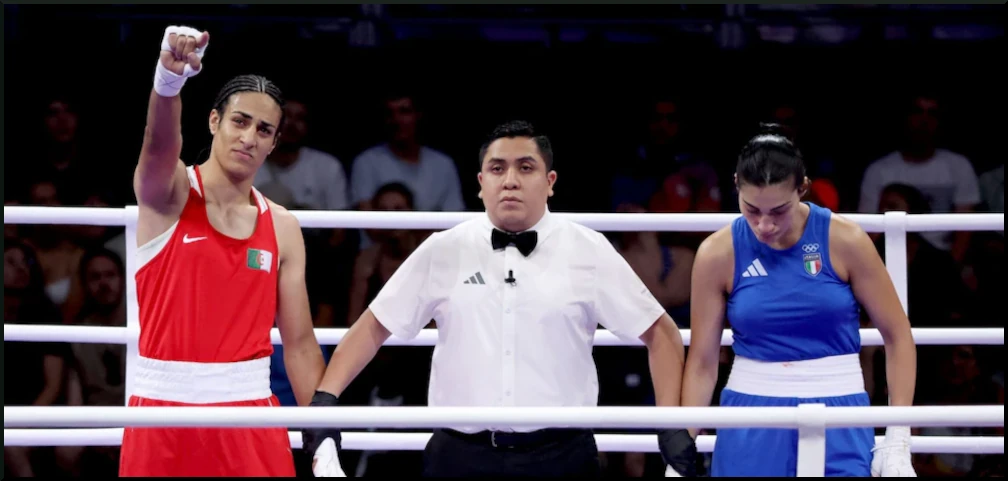by Gabriela Fernandez, published on Resumen English, August 5, 2024
The Paris Olympics have been particularly marked by gender issues. This could be the logical response of a society haunted by the rancid conservatism of a neoliberal right that is gaining strength and for which the state should not have a say or regulate on sexual and reproductive freedoms. It could also be the marketing strategy of hosts who made their intentions clear from the beginning.
In any case, the fact that some diversities cause more controversy than others is closely related to that conservative current; a current that drags every “sleeping shrimp” into the Olympic pool of intolerance for the most innocuous diversities – and gives the really harmful ones the same fate as the Dead Sea.
A huge scandal has erupted with the victory of Algeria’s Imane Khelif over Italy’s Angela Carini. A rule of the Olympics is that it’s win or lose, so the situation would not have been a scandal had it not been for the boxer who bore the brunt and complained dramatically about the strength of her opponent.
But this was not the news. The sensationalism focused on whether trans people should compete, completely ignoring the detail that the Algerian is not even trans: she is a cis woman with a hormonal disorder that causes her to produce more testosterone than is considered “normal” for a woman.
This condition certainly gives her an advantage over athletes who do not suffer from it, but not enough to save her from losing a third of her competitions. Her record – though very good – is nowhere near that of the unsurpassed American swimmer Michael Phelps, who holds the record for the most awards in that sport.
Phelps also suffers from a medical condition that makes it much easier for him to succeed, and his talent has never been questioned. Phelps was born with an extended wingspan and double jointed ankles contributing heavily to his legendary status in the pool. If we question Phelps’ physical advantage, in all fairness, we would have to point to a number of other advantages that influence his success. But nobody says anything about Phelps or tries to diminish his medals.
The conditions under which Phelps – a white man from the “first world” – trains and prepares are not those of most of the players who compete against him under the same rules and with the same demands, as if they had had access to similar opportunities for improvement.
What tools do the countries, overwhelmed by the development of others, have to face the beneficiaries of their disaster?
The diversity that the hosts decided to show deserves spaces, deserves respect, and deserves visibility, but since we are in a position to recall the guillotine to the oppressive systems, it would have been interesting to show the trainings in different geographical areas, to speak properly of diversity and justice.
How did the plundered colonies prepare themselves to be able to pay for this “rock ‘n’ roll” and polluting spectacle?
How do women with sporting concerns do it in Saudi Arabia?
How did Haiti prepare itself in the midst of anarchy and violence?
How have our athletes here in Cuba prepared themselves during more than 60 years of blockade?
How did the Palestinians prepare, while missiles were killing their people, to compete against their tormentors? How did the guilty prepare?
There is not and will not be a fair Olympic competition as long as there is no fair world. Making a parallel competition for women and men who do not adhere to the standards of “normalcy” is not going to stop the normal from our athletes from handing over their medals in exchange for the opportunities that are stolen from us.
The best apology for justice would be to remember that, when it comes to cutting off heads, we are only serfs against monarchs; and we will never see that in capitalist France. However, it would have been interesting – at least as a mea culpa for becoming that which they intended to destroy – if they had taken some tiny part of the billions of euros spent on the Olympics as an “investment” to hand out cakes to their starving protectorates, in the best Marie Antoinette style.
*Featured Image: Imane Khelif (left), a boxer with abnormally high testosterone levels, beat Italy’s Angela Carini on Thursday in Paris Credit: EPA/Yahya Arhab
Editor’s note: I had mixed feelings about this concern myself, largely because Imane Khelif has a very masculine appearance (not surprising, I suppose, with her high levels of testosterone). This article, however, really moved me by placing the story in a larger context (broader that ‘support for women’), where it took on very different coloration than as originally told.
Source: Cubadebate, translation Resumen Latinoamericano – English
